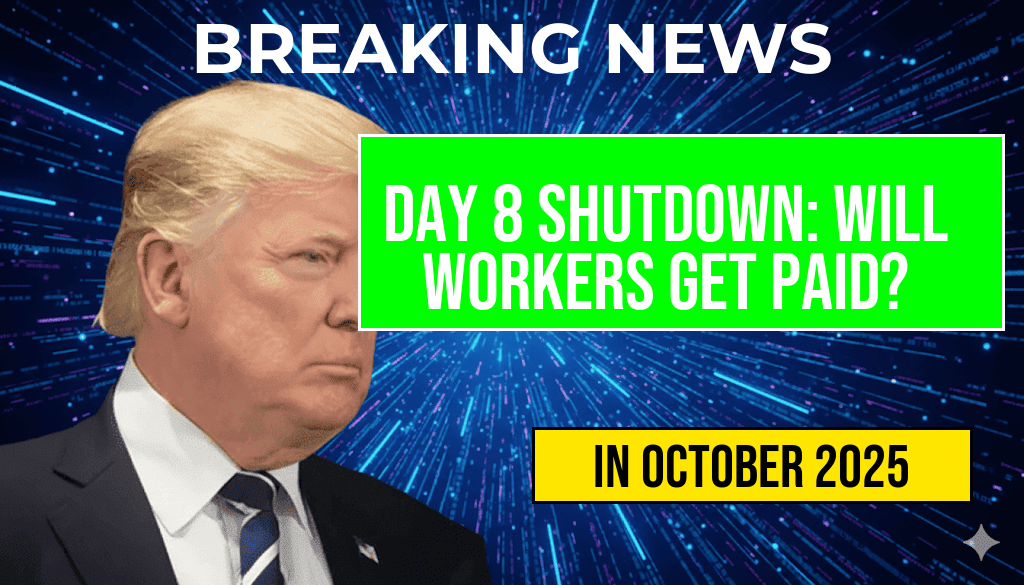As the federal government enters its eighth day of shutdown, thousands of federal workers remain in limbo, caught between halted operations and uncertain compensation. While some agencies have implemented partial closures or furloughs, the core question for many employees centers on whether they will receive their full paychecks or face delays and deductions. With negotiations between congressional leaders and the Biden administration at a standstill, the fate of federal workers’ wages hangs in the balance, raising concerns about financial stability for thousands of families across the nation.
Overview of the Shutdown’s Impact on Federal Employees
The shutdown, triggered by a lapse in appropriations due to unresolved budget disagreements, has led to widespread disruptions within various federal agencies. According to the Office of Personnel Management (OPM), approximately 70% of federal employees have been furloughed or required to work without pay, depending on their agency and role. While some essential personnel continue working to maintain safety and critical functions, many others are sidelined, raising questions about their immediate financial needs.
Legal and Policy Framework for Federal Pay During Shutdowns
Historically, the federal government has maintained a pattern of paying employees promptly after shutdowns end, rather than providing back pay for periods of non-work. However, legislation varies depending on the circumstances. The Antideficiency Act restricts federal agencies from incurring obligations or expenditures beyond appropriations, which complicates the process of issuing paychecks during a shutdown.
In most cases, Congress passes emergency funding measures or specific legislation to ensure federal employees receive their paychecks once the government reopens. For example, during previous shutdowns, the Pay Our Coast Guard Act and similar measures have been enacted to provide retroactive pay to affected workers. Nonetheless, until such legislation is passed, many federal employees face uncertainty regarding their compensation.
Current Status of Federal Employees’ Pay
| Employee Category | Status | Expected Payment |
|---|---|---|
| Essential workers (e.g., public safety, health) | Working without pay | Delayed until shutdown resolution or legislation enacted |
| Furloughed employees | Not working, not paid | Potential for retroactive pay after government reopens |
| Contractors and support staff | Varies by contract | Dependent on contract terms and agency policies |
Many federal workers have expressed concern over their immediate financial obligations, including rent, utilities, and childcare. While the Omnibus Appropriations Act of 2023 does include provisions for back pay, the timing of payments remains uncertain, especially if negotiations continue to stall.
Legislative Efforts and Political Implications
Lawmakers from both parties have expressed differing views on how to address federal workers’ compensation amidst the shutdown. Some members of Congress advocate for immediate retroactive pay, emphasizing the financial hardship faced by employees. Others argue that funding should only be restored through broader budget agreements, linking federal employee compensation to larger fiscal negotiations.
Senators and Representatives are pushing for emergency legislation to guarantee pay for workers affected by the shutdown. The Federal Employee Fair Pay Act is among the proposals gaining traction, which aims to ensure timely payment regardless of government funding status.
Economic and Social Considerations
The prolonged shutdown not only impacts individual federal workers but also ripples through local economies. Small businesses that provide services to government agencies report reduced patronage, and financial institutions note increased requests for short-term loans. Economists warn that if the shutdown extends beyond two weeks, the cumulative economic costs could escalate, impacting consumer confidence and spending.
Resources and Support for Affected Employees
- Financial assistance programs: The Federal Emergency Management Agency (FEMA) and other agencies have set up resources to help furloughed workers access emergency loans and financial counseling.
- Legal protections: Employees are encouraged to stay informed about their rights through official channels such as OPM guidance.
- Community support: Nonprofits and local organizations are mobilizing to provide food assistance and other services to federal workers and their families during this period.
Looking Ahead
As negotiations continue with no immediate resolution in sight, federal workers face mounting uncertainty. The coming days will be critical in determining whether legislation will be enacted to ensure their pay, or if delays will persist. Experts suggest that the Biden administration and congressional leaders need to reach an agreement swiftly to prevent further economic strain on federal employees and the broader economy.
For now, federal workers and their families are urged to monitor official updates and plan accordingly. The situation remains fluid, with potential legislative developments possibly changing the current trajectory.
Additional information on government shutdowns and their impacts can be found at Wikipedia’s page on U.S. government shutdowns.
Frequently Asked Questions
Question
Will federal workers receive full pay during the shutdown on Day 8?
Question
What criteria determine whether federal employees get paid or not during a government shutdown?
Question
Are essential workers still working without pay during the shutdown?
Question
Is there any financial assistance available for federal workers affected by the shutdown?
Question
How might the shutdown impact public services and benefits provided by the federal government?






